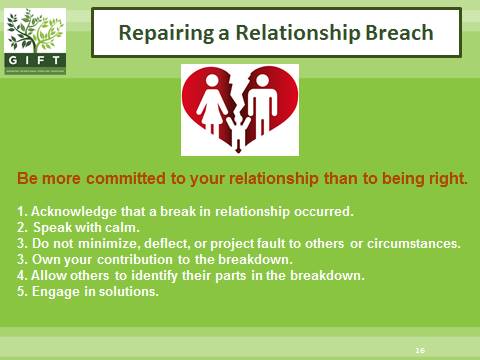 In our previous post we examined how to repair breaches in our relationships. Families who regularly practice this skill improve the quality of their relationships. One obvious point that cannot be overstated: Begin and end with connection. This is the conduit to effective communication. It opens hearts and minds.
In our previous post we examined how to repair breaches in our relationships. Families who regularly practice this skill improve the quality of their relationships. One obvious point that cannot be overstated: Begin and end with connection. This is the conduit to effective communication. It opens hearts and minds.
As Dr. Karen Purvis taught, “Connect before correct.” In the absence of connection our words are processed as static, background noise that is easily dismissed. To get children to care about and listen to us, they must feel connected to us. Think about it. Connection is just as important to us as adults; we tune out those who feel peripheral or irrelevant to us and choose to attend only to those whom we judge as important. We do not allow acquaintances or strangers to dictate our actions. We heed sources which we value, those to which we feel connected.
But even the healthiest relationships experience conflict. Most often, these difficulties arise out of communication mismatches. We may think we conveyed our intent clearly but often we have not. Consider these common tripwires. Sometimes we expect family members to read our mind. We feel wounded when they do not guess accurately because they should know. Accurate mind reading is after all, an unreliable and unlikely ability. We stew. Tensions increase.
Another common communication mismatch occurs when we give directives. In an effort to be courteous and not appear overly bossy, we may say,
- “Please do the dishes,”
- “Please, clean up your room.”
- “Please do your homework.”
- “Please be home at a reasonable hour.”
Think back to a time when you spoke similar statements. Most likely, you expected compliance. But, some people–especially kids and spouses–might interpret these as requests and see fulfillment as an option.
In our mind fulfillment of these tasks is NOT optional. We expect action. And most likely, we want it promptly. We’ve fallen into a common communication error. In each of these statements we’ve disguised a requirement as a request and set everyone up for frustration and failure. The completion time frame is undefined. Our idea of a clean room probably differs dramatically from a teen’s standards. This is a classic set up for conflict. What is a parent to do?
With a dash of intentionality, many conflicts can be avoided. First, we must be clear in our own minds. What is our intention? Are we making a request or a requirement? To help answer that question let’s establish the distinction between a request and a requirement.
The most obvious is that a requirement must be done while a request is optional and may even be open to negotiation. Requirements also have specific criteria, completion date. On the other hand, requests are optional, have flexible completion timelines and negotiable terms.
In our next post we’ll focus on how to frame a request clearly and ensure completion.
Listen to our podcasts: Adoption Matters: Real People. Real Life. Real Talk and Essentials of Adoption Attuned Parenting
Read Books written by our coaches
Click to learn more about Adoption Attuned Certified coaching!



So when you suggest intentionality in this, we can take a minute to get clear about our purpose for asking and keep in mind that family members are not mind readers. We want to be clear as to a request or requirement. Either mismatched communication can lead to conflict and misunderstanding. Been there and done!
Thinking that family members can read your mind — after all, they should know! — is egocentric, passive aggressive, and narcissistic! As for the request vs. requirement, you got to check in with yourself about it for sure! I think parents slip into automatic here and expect compliance not realizing that there may be room for choice in some cases. #adoptiveparenting #adoptivefamilies #AAQ #adoption